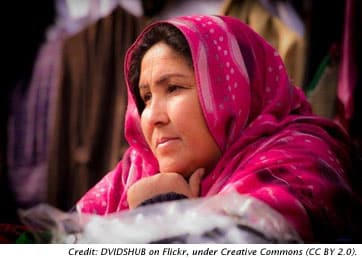
 NEW YORK (WOMENSENEWS)–After the U.S. killing of Osama bin Laden this week, the organization Women for Afghan Women reported an eerie quiet in Kabul.
NEW YORK (WOMENSENEWS)–After the U.S. killing of Osama bin Laden this week, the organization Women for Afghan Women reported an eerie quiet in Kabul.
"Police are patrolling the streets," Manizha Naderi, executive director of Women for Afghan Women (WAW), wrote to her supporters on May 2. "But very few people are walking around, and even at the office, people aren’t talking about the news that is ricocheting across the world–Osama bin Laden has been killed."
Naderi instructed all staff members "to lie low for the next few days." Offices would remain open, but travel would be avoided.
"We simply cannot know whether the death of bin Laden is or is not good for the Afghan people, but we are worried about what will happen next," she wrote. "Will al-Qaida and the Taliban be weakened? Will negotiations with the Taliban be stepped up? Will this decade-long chapter in Afghanistan’s history end with the foreign troops hastening away?"
Naderi advocates for women in a country that–in the week ahead of Mother’s Day–took the limelight for a reason other than its Taliban sphere of influence.
Afghanistan came in last on Save the Children’s latest annual global rankings of countries on the basis of maternal health. The U.S., in 31st place, had its own black eye for having one of the highest rates of maternal mortality in the industrialized world. The best place in the world to be a mom is Norway, where the average maternity leave is about one year.
Numerous Reasons
The reasons for Afghanistan’s last place–164 out of 164–are no doubt numerous, but a note in Naderi’s e-mail about the group’s difficulty setting up shelters for battered women highlights women’s lack of autonomy there.
"The government still wants shelter clients to be handed over to any family member who comes to claim them," Naderi wrote in her e-mail. "WAW will never agree to such a clause because it negates the whole purpose of a safe house. With the continued support of all our allies and supporters, we will prevail in this case as well."
In closing, Naderi said that bin Laden’s death has done little for the girls and women in this country. "They still live in a country that is ravaged by poverty, corruption, violence and terror. They still must cope with a conservative culture that does not uphold their human rights."
President Barack Obama’s hero-style appearance here in New York on Thursday–just a few blocks from the Women’s eNews office–seemed somewhat surreal. A couple of staffers ventured into familiar streets transformed by security barricades, crowds and rows of news trucks carrying huge white satellite discs. But they quickly scurried back.
Lack of Jubilation
Women’s eNews is a media enterprise, but these scenes of jubilation over the killing of bin Laden just weren’t our amphitheater.
Wednesday, after all, brought a reminder of spreading U.S.-style restrictions on women’s autonomy. That day, the U.S. House passed H.R. 3, a bill that essentially ends insurance coverage of abortion for women, even when serious health consequences are involved.
And Amnesty International added to the grim news about U.S. motherhood, finding in a study of its own that it was safer to give birth in 49 other countries than in the United States.
But if anyone cast a glow over a week of cloudy news it was Rep. John Conyers of Michigan. On May 11 he will be holding a hearing on the Maternal Health Accountability Act. The Conyers bill, according to Amnesty International, would help establish maternal mortality review committees in every state to examine pregnancy-related deaths and identify ways to reduce deaths.
The lack of data or even major societal concern about U.S. maternal mortality–particularly among African American women–has been a major refrain in a series of articles Women’s eNews has produced over the last three years on black maternal health.
The legislation, Amnesty International says, would help eliminate disparities in health care, risks and outcomes, and would improve data collection and research in order to reduce the frequency of severe maternal complications. In other words: a cause to celebrate in the streets.
Read the full weekly news wrap up here.
Corinna Barnard is editor of Women’s eNews.
Would you like to Comment but not sure how? Visit our help page at https://womensenews.org/help-making-comments-womens-enews-stories.
Would you like to Send Along a Link of This Story? https://womensenews.org/story/the-world/110506/bin-laden-death-raises-cautious-questions-in-kabul


